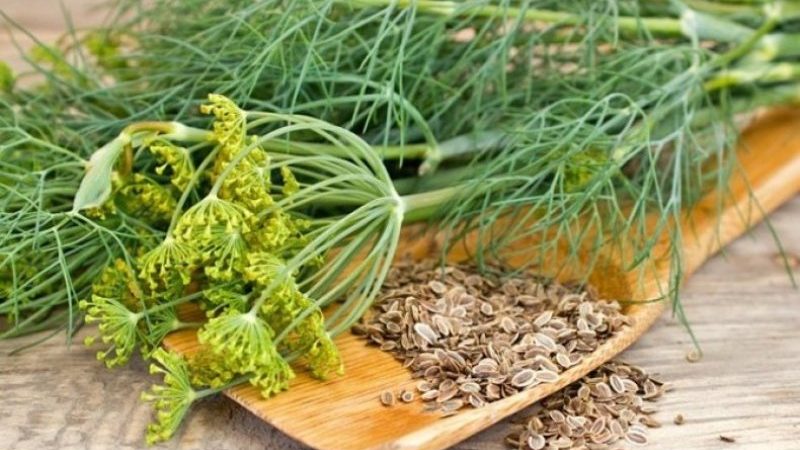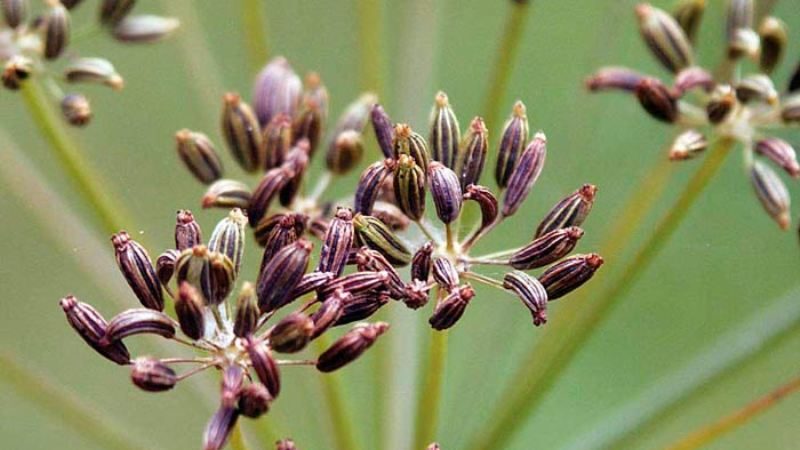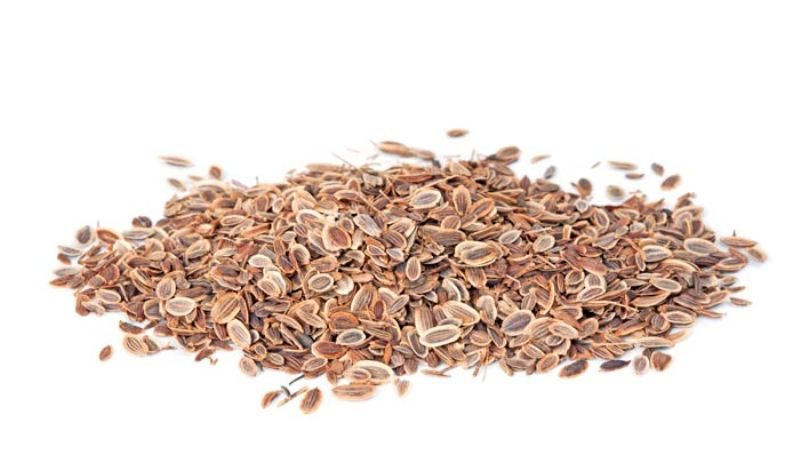The healing properties of dill seeds: folk recipes and contraindications
Dill began to be cultivated around ten thousand years BC. e., as evidenced by archaeological excavations. He is mentioned in the writings of Dioscorides, who was considered not just a doctor and pharmacologist, but was listed as the father of botany, the author of the work "On Medicinal Substances" in Ancient Greece.
Everyone is accustomed to using dill seeds for food, adding to soups, sauces, salads, breads and other dishes. But the spice has more than just this use. Infusions with it will perfectly help to cope with many diseases at the stage of their development, and without any chemistry. But be careful not to harm yourself: dill seeds have both medicinal properties and contraindications.
The content of the article
The chemical composition of dill seeds
Dill in Latin sounds like Anethum. It is a herbaceous annual plant of the Umbelliferae family with leaves and stems that die off at the end of the ripening period. The stem reaches a height of 150 cm. The leaves are pinnately dissected, ovate.

Flowers are collected in double umbrellas up to 9 cm in diameter. Seeds are ovoid or broadly elliptical, 3-5 mm in length and 1.5-3.5 mm in thickness.
Blooms in June-July. The fruits ripen in July-September. The plant is found everywhere and is often perceived as a weed. In the wild, it is found only in southwestern and central Asia, North Africa, Iran and the Himalayas.
 Annethum has a strong spicy odor. The composition of each part of the seasoning is different. They are united by the presence of essential oil, thanks to which dill smells specifically. Most of all it is contained in seeds - from 2.5 to 8%. The oil itself is a light yellow liquid with a pleasant, delicate smell, reminiscent of the smell of caraway.
Annethum has a strong spicy odor. The composition of each part of the seasoning is different. They are united by the presence of essential oil, thanks to which dill smells specifically. Most of all it is contained in seeds - from 2.5 to 8%. The oil itself is a light yellow liquid with a pleasant, delicate smell, reminiscent of the smell of caraway.
Fruit Oil Components:
- d-carvone (30-50%);
- d-limonene;
- α-pellandrene;
- α-pinene;
- dipentene;
- dihydrocarbon.
Nutritional value per 100 g of product:
- carbohydrates - 55.2 g;
- fat - 14.54 g;
- proteins - 15.98 g;
- water - 7.70 g;
- ash - 6.58 g.
Caloric content - 305 kcal per 100 g of product.
Annethum contains 21.1 g of fiber, without having sugars, cholesterol and trans fats.
Of the fat-soluble vitamins, only vitamin A is present in the seeds of Anethum. Of the water-soluble vitamins, vitamins C, B1, B2, B3 (PP), B6 and B9 are present.
The percentage of vitamins:
- A - 3 mcg (0.3% DV);
- C - 21 mg (23.3%);
- B1 - 0.4 mg (34.8%);
- B2 - 0.3 mg (21.8%);
- B3 2.8 mg (17.5%);
- B6 0.3 mg (19.2%);
- B9 10 μg (2.5%)
The ratio of minerals (macro- and microelements) contained in dill fruits:
- calcium - 1,516 mg (151.6% of the daily value);
- iron - 16.3 mg (163.3%);
- magnesium - 256 mg (64.0%);
- phosphorus - 277 mg (39.6%);
- potassium - 1,186 mg (25.2%);
- sodium - 20 mg (1.5%);
- zinc - 5.2 mg (47.3%);
- copper - 0.8 mg (86.7%);
- manganese - 1.8 mg (79.7%);
- selenium - 12.1 μg (22.0%).
Dill seeds: medicinal properties
Many of us know about the medicinal properties of seasoning seeds from birth, without even knowing it. The so-called "dill water" is used for newborns (to get rid of colic) by all mothers.
For men infusions and decoctions useful as a vasodilator that can affect the strength of male potency. Biologically active substances of the plant increase immunity, give strength.
Among women they normalize the menstrual cycle, reduce cramping during critical days. Milk production increases in nursing mothers. The ladies will also be interested in the ability of Anethum to improve skin color, removing the inflammatory effect in the form of acne, irritation and redness.
In some cases, a decoction is used, in others - an infusion, in others, beneficial properties are revealed in ground or soaked seeds mixed with various herbal ingredients.
Here is a far from complete list of useful properties of dill:
- Due to the presence of vitamin A, the consumption of the herb improves the health of the skin and eyes, and supports the immune system.
- B-carotene has antioxidant properties.
- Vitamin C is responsible for the functioning of the immune system, promotes the absorption of iron. Deficiency of vitamin C leads to loose and bleeding gums, nosebleeds due to increased permeability and fragility of the blood capillaries.
- Essential oil improves the motility of the digestive tract, increases appetite, and normalizes metabolism in the body.
- Palmitic and lauric fatty acids have pathogenic and diuretic effects.
- Thanks to magnesium hydroxide and sodium sulfate, dill is a good laxative.
- Due to the presence of vitamin B6 and phosphorus, it has a sedative effect, normalizes the functioning of the nervous system, and helps in the fight against insomnia.
- The benefits of glycosides and monosaccharides are expressed in reducing high blood pressure, dilating blood vessels, and improving heart rate.
- Phytoncides and vitamins eliminate disease-causing viruses and stimulate the excretion of mucus from the lungs, possessing bactericidal and expectorant properties.
- Disaccharides and monounsaturated acids are responsible for stimulating the gastrointestinal tract, increasing appetite and speeding up the digestion process.
- By inhibiting the synthesis of RNA and proteins, the seed extract is able to suppress the growth of cancer cells.
- Calcium helps prevent decreased bone loss after menopause and in rheumatoid arthritis.
Traditional medicine recipes
The fruits are harvested when they begin to ripen. The seed inflorescences are cut, placed in a paper bag and left in a warm, dry place out of sunlight for one week. Then the seeds are easily separated from the stems and stored in an airtight container.
The fruit of garden dill (lat.Fructus Anethum graveolens) is used as a medicinal raw material.

Now let's talk more about the use of dill seed and what it heals, as well as how to take it correctly.
Cleansing blood vessels
Blockage of blood vessels is a big problem of the circulatory system. You can improve the condition with such an infusion: take one and a half cups of valerian root for one glass of seed. The mixture is brewed with boiling water and kept in a thermos until cooled.
Take three times a day, one tablespoon half an hour before meals, until the infusion ends. Fatty and sweet foods, coffee and strong tea should be excluded from the diet. You can repeat it after 5 years.
Getting rid of parasites
Worms are parasitesthat impair the functioning of the digestive tract. Do not think that helminthic infestation is a disease of children, parasites also appear in adults. In case of illness or for the purpose of prevention, use this recipe.
2-3 hours after dinner, eat one tablespoon of whole seeds, then one tablespoon of ground seed, after three hours, take two tablespoons of castor oil and put on an anti-inflammatory and wound healing rectal suppository. The course is three days.
Read also:
How to use pumpkin seed oil for worms and how effective it is.
With bloating
For stomach discomfort and flatulence, a decoction of dill seeds will help: dilute 1.5 teaspoons of the fruit in one glass of cold water, boil and keep simmering for another 15 minutes.
Cool to room temperature, strain. Drink 30 minutes before meals. Prepare a fresh drink every time.
For diseases of the pancreas
When the pancreas becomes inflamed, acid reflux, gas or diarrhea occurs. A pinch of young fruit powder with a little water will relieve these unpleasant symptoms.
If the discomfort continues, a decoction will help: for one glass of boiling water, take one teaspoon of the fruit of the seasoning. Brew and leave for 30-40 minutes.Strain before use, take 2-3 tablespoons throughout the day.
With increased pressure
With hypertension, such a decoction is prepared: pour 300 ml of boiling water over one teaspoon of seed, leave for 3-4 hours. When there is no time to prepare drinks, it is recommended to consume one teaspoon of ground seeds with each meal.
Cystitis (men and women)
Dill tea can relieve spasms and speed up the elimination of fluid from the body. Thanks to the antibacterial effect, the bladder and urinary tract will be cleansed of pathogenic bacteria, and inflammation will decrease. The recipe for its preparation is as follows:
- Pour two teaspoons of seeds with a glass of drinking water, simmer over low heat for twenty minutes. Cool to room temperature. Strain and drink 5-6 times a day for a week.
- Pour one teaspoon of chopped fruits with a glass of hot water. Insist in a thermos for 12 hours. Drink in the morning on an empty stomach. Take 5-7 days.
Pregnancy: toxicosis, edema, ARVI
During pregnancy, plant seeds help to cope with nausea, vomiting and weakness during toxicosis. They also serve as the prevention of edema in the second trimester and relieve the symptoms of SARS.
To do this, consume 100 ml of dill seed decoction 3 times a day. The duration of the course of treatment is 2-4 weeks.
Attention! The expectant mother should consult a doctor about the possibility of using the fruit of dill.
Dill seeds for lactation
Dill infusion is almost always safe for mother and child.
To improve milk production in a nursing mother, a decoction is prepared: pour one tablespoon of seeds with one liter of boiling water and boil for 5-7 minutes over low heat. Cool to room temperature, strain and drink 5-6 times a day 1 hour before feeding.
Dill water from dill seeds for newborns
A drink from the fruits of the plant will perfectly help against colic - decoctions and infusions from seeds are part of many pharmacy products that are prescribed for gas and abdominal pain in infants. They rank first in terms of effectiveness in combating constipation.
Preparing dill water from dill seeds for newborns is simple. Use one of the following methods:
- Pour 200 ml of boiling water over one teaspoon of seed, cover with a lid, leave for an hour, filter, cool to room temperature.
- Mix water and seeds in the same proportions and keep in a water bath for 30 minutes. At the end of cooking, add water to the volume of the broth (one glass). Before giving the drink to the baby, filter and cool.
Drinking dill water for newborns is necessary in small portions (1-2 teaspoons each) about 3-4 times a day, with severe pain, the number of receptions is increased. The child will feel relief within 10-15 minutes.
The broth is safe, pediatricians allow the use of dill seed already from 2-3 weeks of life.
Important! Before using any folk remedy, you should definitely consult your doctor for individual contraindications.
With conjunctivitis
Grind the Anethum seeds, add 120-140 ml of water to ½ tablespoon of powder, bring to a boil and boil for 5 minutes. Rinse eyes with broth up to three times a day. You can also apply moistened cotton swabs for 10 minutes. The recommended course of treatment is 10 procedures.
Harm and contraindications
Powders, decoctions, infusions from dill seeds help to cope with many diseases, but, like any medicine, they have contraindications.
It should be used with caution:
- With reduced pressure (hypotonic) - spice essential oils are able to reduce pressure.
- People with allergic reactions to herbs and plants. Test with a small amount of seeds for allergies or not.
- Those who suffer from chronic diseases need to consult a doctor before treatment with dill seeds.
- People with reduced blood clotting and taking blood thinners ("Warfarin", "Cardiomagnet").
- Pregnant and lactating women - only after consulting a doctor. Avoid using in the last months of pregnancy.
- In cases of various types of bleeding (for example, menstrual type).
It is worth starting to use decoctions and infusions of dill fruits with small trial portions. If any negative symptoms appear - weakness, drowsiness, discomfort, blurred vision, rashes - immediately consult a therapist and stop treatment until the circumstances are clarified.
Read also:
Effective dill treatment for urinary incontinence: folk recipes.
Conclusion
Dill seeds are rich in trace elements and are beneficial for the body. With their help, you can not only improve the taste of familiar dishes, but also improve your health. In the presence of problems with the gastrointestinal tract, to maintain immunity and the nervous system, improve the condition of the skin, to help expectant mothers and babies, you can use decoctions and infusions from dill seeds.
It is important to follow the rules of use, do not forget about the presence of contraindications. Consider the fact that before any use of traditional medicine, a doctor's consultation is required.